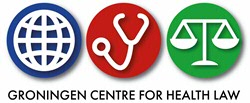New research centre: the Groningen Centre for Health Law (GCHL)

The Faculty of Law has a new research centre: the Groningen Centre for Health Law (GCHL). Within the new centre two existing centres have been merged, the Groningen Centre for Children's Rights in Health Care and the Global Health Law Groningen Research Centre. The GCHL focuses on national and international health law with special attention to human rights. The opening took place on 12 May 2022 during the international congress Tobacco, Law and Human Rights: crossing borders, spaces and substances.
Health law is a specialism within the field of law that is described as the body of legal rules directly related to health care. The field of law focuses on the study and application of these legal rules and the related legal relationships, both in theory and in practice. Cooperation with other scientific (healthcare) disciplines plays a major role in this.
Education and Research
Taking the right to health as a starting point, teaching and research at GCHL focuses on issues of access to care, aspects of medical professionalism, promotion of health and prevention of disease, medical scientific research involving humans, and the beginning and end of life. Other research themes are demographic and/or geographical health inequalities, the position of vulnerable patient groups, reproductive and mental health, and a healthy living environment. GCHL provides corresponding legal teaching at the university level (Dutch and English), also for the annual summer school, and for medical training courses within the University Medical Center Groningen (UMCG).
Multidisciplinary

The GCHL is a specialized centre that works in a multidisciplinary setting. Professor of Health Law in an International Perspective and director of the GCHL Brigit Toebes: 'We study and analyze issues that affect the health of different groups of people. These include children, adults, women, the elderly, the disabled, and ethnic minorities.

Children are a special category because of their vulnerability and dependence. This plays a role in medical care for children. Jo Dorscheidt, University Lecturer in Health Law, is attached to both the Faculty of Law and the University Medical Center Groningen (UMCG). In medical care for children, questions regularly arise about the way in which the fundamental rights of the child are at stake. Respect for these rights, as laid down in the International Convention on the Rights of the Child (CRC), rests with the international community of states, individual states, and also with healthcare institutions, and individual healthcare providers. However, this has not yet been systematically mapped out,' says Dorscheidt.
Human rights
Through the expertise of qualified members and fellows, GCHL focuses on the human rights dimension of health Law. Toebes: 'There are multiple factors that influence the health and wellbeing of individuals, which is why our members combine their professional skills to address health-related challenges. Some of the research themes are: tobacco control, regulating unhealthy food, infectious disease control, climate change and health, and mental and reproductive health.
For more information see the website of the Groningen Centre for Health Law.
This article was published by the Faculty of Law.
More news
-
08 December 2025
Colourful Characters: Bert Röling
